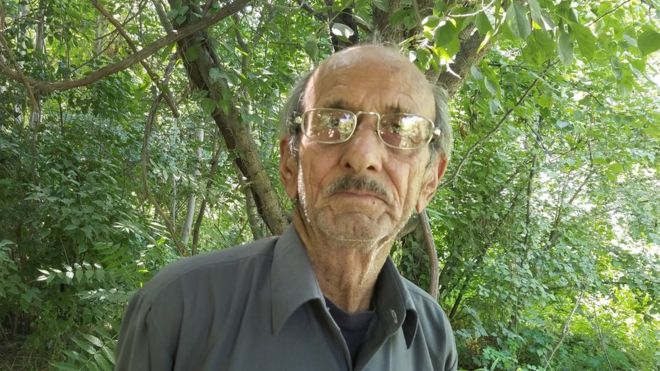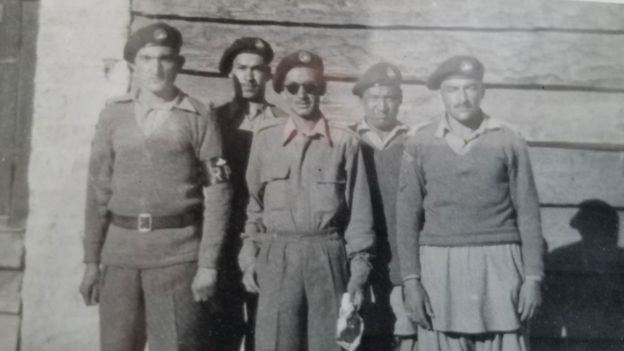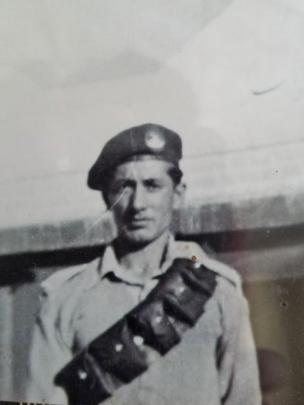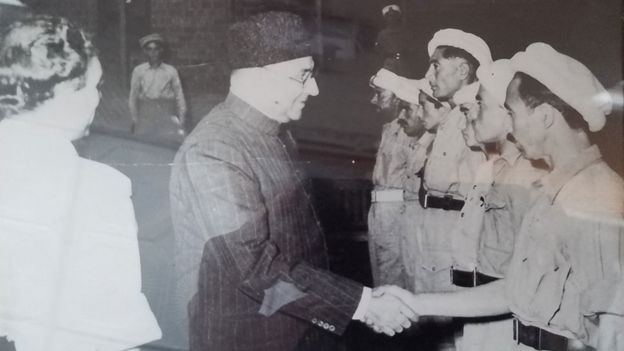
دوسری جنگِ عظیم کے دوران ایک امریکی اور ایک جاپانی فوجی کسی غیرآباد جزیرے میں گھر جاتے ہیں اور دونوں کے درمیان وسائل پر قبضے کے لیے ایک دوسرے کو زیر کرنے کی طویل جنگ چھڑ جاتی ہے جس میں کبھی ایک مغلوب ہوتا ہے کبھی دوسرا۔
اسی طرح ایک دوسرے سے لڑتے بھڑتے سالہاسال گزر جاتے ہیں اور ان دونوں کو معلوم نہیں ہو پاتا کہ دوسری جنگِ عظیم کب کی ختم ہو چکی ہے۔
اس کہانی پر فلمیں بن چکی ہیں، لیکن بہت کم لوگوں کو معلوم ہے کہ انڈیا اور پاکستان کے درمیان کشمیر میں لڑے جانے والی جنگ میں بالکل ایسا ہی ایک واقعہ پیش آیا، تاہم اس پر فلم بننا یا کتاب لکھے جانا تو کجا، بہت کم لوگوں کو اس کے بارے میں علم ہے۔
اس واقعے کے واحد زندہ کردار محمد امین ہیں جو سکردو کے مضافاتی گاؤں سندس میں انگور، خوبانی، سیب اور چیری کے باغ سے گھرے ہوئے گھر میں رہتے ہیں۔
ملیشیا شلوار قمیص میں ملبوس محمد امین کو خوبانی کے حجم کے لذیذ سیب کے درختوں کی دیکھ بھال کرتے دیکھ کر ایسا لگا ہے جیسے وہ جنم جنم سے دنیا کے اسی پرامن ترین پیشے سے وابستہ چلے آئے ہیں۔
لیکن جب وہ اپنی کہانی شروع کرتے ہیں تو ان کی آنکھوں میں تاریک سائے دوڑ جاتے ہیں جن کے اندر جنگ کی تباہ کاریاں، محصوری کا ہراس اور ناقدری کا احساس سب کچھ نمایاں ہوتا ہے۔
محمد امین اور ان کے مٹھی بھر ساتھیوں نے 11 ماہ تک انڈین فوج کے محاصرے میں گزار کر ہمت، شجاعت اور برداشت کی وہ داستان رقم کی ہے کہ اگر ان کا تعلق یورپ یا امریکہ سے ہوتا تو ہالی وڈ انھیں جنگی ہیرو بنا کر کب کا دنیا بھر میں مشہور کر چکا ہوتا۔
ذیل میں ان کی کہانی انھی کی زبانی پیش کی جا رہی ہے جس میں وہ 1947 میں کشمیر جا کر لڑنے، وہاں 11 ماہ تک محصور رہنے اور پھر واپس آ کر اپنے ساتھ ہونے والی ناقدری کی روداد بیان کر رہے ہیں۔

ہم یہاں مشکل سے بھرتی ہوئے، سب نے کہا چھوٹا ہے، رائفل نہیں اٹھا سکتا، میری گیارہ بارہ برس عمر ہو گی۔ میں نے کہا میں خود اٹھاؤں گا رائفل، آپ کو زحمت نہیں دوں گا۔ ہم کل 95 نفر تھے، کوئی تربیت نہیں دی گئی، بس بتایا گیا کہ فائر اس طرح کرنا ہے، یا جہاز آئے تو اس طرح چھپنا ہے۔
ہمیں اس طرف بھیج دیا گیا۔ ہمیں پتہ ہی نہیں تھا کہ کس طرف جانا ہے۔ جب ہم دائیں مڑے تو پتہ چلا کہ کرگل جا رہے ہیں۔ یہاں سے کرگل آٹھ گھنٹے کا راستہ ہے۔ وہاں سے ہمیں تین حصوں میں تقسیم کیا گیا۔ ایک پارٹی کو لداخ بھیج دیا گیا۔ دوسری دراز جائے گی، باقی رہ گئے ہم۔ ہمیں نائیک بنا دیا گیا اور دو فیتے لگا دیے گئے اور ہمیں پدم بھیج دیا۔ آٹھ دن پیدل چلنے کے بعد ہم پدم پہنچے۔ یہ بدھسٹوں کا علاقہ تھا۔ لال قمیص شلوار پہنتے تھے وہ۔ ایک چوٹی کے اوپر مندر تھا جس میں وہ پوجا کرتے تھے۔ ہم وہیں رک گئے۔
اسی دوران لداخ میں جنگ ہو رہی تھی۔ ہمیں خبریں آ رہی تھیں کہ کل فتح ہو گا، پرسوں فتح ہو گا۔ کہا کہ یہاں بہت برف گرتی ہے۔ کورا جمتا ہے۔
پھر وہاں ہندوستانی فوج آ گئی۔ رات کو ایک بجے انھوں نے فائر کیا۔ ہر طرف آگ کے شعلے نظر آتے تھے۔ ہم لوگ بدھسٹوں کے گاؤں میں محصور ہو گئے۔ دیواروں میں سوراخ کر کے دیکھتے رہے۔ ان کی نسبت ہم نہ ہونے کے برابر تھے۔ صبح پتہ چلا کہ حالت خراب ہے۔ ہم لوگ ایک رات کے لیے آئے تھے۔ لیکن یہاں گھر کر رہ گئے۔
جنگ لڑتے رہے۔ دشمن ہمارے ارد گرد آ گئے، دوسرے تیسرے دن۔ لمبے تڑنگے۔ برانڈی پہنے ہوئے۔ مورچے آمنے سامنے تھے۔ انھوں نے وہاں سے آوازیں لگانا شروع کیں۔ کہتے تھے، تم بچے ہو،، تمھارے منھ سے ماں کا دودھ ابھی سوکھا نہیں ہے، ہتھیار ڈال دو۔ ہم نے کہا کہ مر جائیں گے، ہتھیار نہیں ڈالیں گے۔
چھ مہینوں تک ہمیں پتہ نہیں تھا، نیند کس چیز کا نام ہے، آرام کیا چیزہے۔ بچھانے کے لیے کچھ نہیں تھا، کھانے کے لیے کچھ نہیں تھا۔ البتہ کارتوس ہمارے پاس بہت تھے، اور ڈی وی گن تھے اور ایک امریکی برین گن تھے۔ اس کا منھ چوڑا ہوتا ہے۔ 11 مہینے اس طرح ہوتا رہا۔ وہ کبھی فتح نہیں حاصل کر سکے۔
ہم سات لوگ ایک مورچے میں تھے۔ وہ گرینیڈ مارتے تھے۔ وہ ہمیں کہتے تھے، 'بلتی آج کیا کھایا ہے؟'
ہمارے پاس صرف آٹا تھا۔ ہم برف پگھلا کر کٹورے میں ڈالتے تھے اور اس میں آٹا ڈال کر اسے پیتے تھے۔ کبھی کبھار گرم کر کے موٹی روٹی بنا لیتے تھے۔ ہمیں پتہ نہیں تھا کہ پیچھے کیا ہو رہا ہے۔ کھانے کے لیے کچھ نہیں تھا۔ صرف آٹا بہت تھا۔ نمک بھی سمندری تھا۔ (ہمارے کپڑے پھٹ گئے اور ہم) بےپردہ ہو گئے۔ کسی کے پاس دری ہے تو بوری سینے والے سوئے سے کاٹ کر انڈورویئر بنا لیتے تھے۔ اور کچھ نہیں تھا۔
اتنی برف گرتی تھی۔ تھوک پھینکو تو وہ بنٹے کی طرح نیچے گرتا تھا۔ ہم برف میں پاؤں مار مار کر اوپر جانے کے لیے راستہ بناتے تھے۔

دشمن کے پاس سامان تھا۔ برانڈی تھا۔ وہ اپنی لاشیں بھی گھسیٹ کر لے جاتے تھے کہ کہیں ہمارے ہاتھ ان کی جیکٹیں یا بوٹ نہ لگ جائیں۔ ہمیں صرف دستانے ملے۔ ہمارے پانچ شہید ہوئے۔ وہ بھی دھوکے سے۔
کبھی یہ نہیں سوچتا۔ کبھی کوا چلاتا تھا، سب خوش ہوتے تھے کہ کچھ خبر آئے گی۔ ہمارے پاس وائرلیس بھی نہیں تھا۔ وہیں سے نیپال کو راستہ جاتا تھا۔ ہم نے ادھر ایک مورچہ بنایا۔ ایک دو مہینہ وہاں ٹھہرے۔
ایک دن سب سے میٹنگ کی۔ کسی نے کہا بھاگ جاتے ہیں۔ ہمارے لوگ تقسیم ہو گئے آپس میں مخالفت ہو گئی۔ (کچھ نے کہا کہ چھپ کر فرار ہو جاتے ہیں۔) خود میں اس کے خلاف ہوا۔ میں نے کہا ہم لوگ برف میں دھنس جائیں گے۔ نہ دنیا ملے گی نہ قیامت۔ ادھر ہی مریں گے۔ آخر مشورہ کر کے تین آدمیوں کو بھیج دیا کہ پتہ چلاؤ کیا ہو رہا ہے۔
وہ چھپتے چھپاتے کسی طرح سکردو جا پہنچے۔ وہاں جا کر انھوں نے بتایا کہ پدم پارٹی والے ابھی زندہ ہیں۔ سکردو والوں نے تحقیقات کیں۔ پھر گلگت ہیڈکوارٹر کو اطلاع ہوئی۔ (ہیڈکوارٹر نے انڈیا سے بات کی اور انھوں نے بھی ہمیں جانے دینے کے لیے ہامی بھر لی۔) انھوں نے ہمیں چھڑوانے کے لیے ایک آدمی واپس بھیجا۔
اس طرح 11 مہینے کے بعد ہمیں وہاں سے گلوخلاصی ملی۔
انڈیا والوں نے ہمارے اعزاز میں ایک جلسہ کیا۔ ایک پورے میلے کا اہتمام کیا۔ اس میں نشانہ بازی کا مقابلہ ہوا تو ہم جیت گئے۔ ان کے میجر نے مجھے شاباش دی۔ مجھے اتنا چھوٹا دیکھ کر سب پاگل ہو جاتے تھے کہ یہ کیسے لڑا ہے۔ اللہ نے مجھے ایسی ہمت اور طاقت دی کہ میں موت کے بارے میں سوچتا بھی نہیں تھا۔
واپس آنے کے بعد۔ 21 توپوں کی سلامی دی گئی۔ بڑے احترام کے ساتھ ہمیں لایا گیا۔ سرحد سے یہاں تک ہمارا پیر زمین پر نہیں لگنے دیا۔
لوگوں نے کہا کہ پاکستان بن گیا ہے۔ ہم نے پوچھا پاکستان کیا ہے؟
یہاں سب لوگ رو رو کر فاتحہ پڑھ بیٹھے تھے۔ جب انھیں خبر ہوئی تو بارڈر تک ہمارے لوگ آئے ہوئے تھے۔ میرے گاؤں والے۔ نعرے لگا رہے تھے۔ رمضان کا مہینہ تھا۔
اس کے بعد ہمیں کہا گیا کہ لیاقت علی خان آپ سے ملیں گے۔ ہمیں پتہ ہی نہیں تھا کہ وہ کون ہیں۔ خیر، ہمیں کہا گیا کہ آپ سے وہ کراچی میں ملیں گے۔ ہمیں سفید کپڑے پہنا کر ڈکوٹا جہاز میں بٹھایا گیا، لیکن رستے میں کہا گیا کہ جہاز کراچی نہیں جائے گا، بلکہ گلگت اترے گا، کیوں کہ لیاقت علی خان صاحب خود گلگت آ رہے ہیں۔ وہاں دوسرے دن لیاقت علی خان صاحب آ گئے۔ ہمیں گورنر ہاؤس میں ٹھہرایا گیا۔ وہ جناح کیپ پہن کر آئے تھے۔ لیاقت علی خان نے مجھے چھوٹا بچہ سمجھ کر پرچ سے بسکٹ لے کر میرے منھ میں ڈال دیا۔

پھر انھوں نے دس ہزار روپے دیے، مجھے نہیں، ساری پارٹی کو۔ اور کہا کہ یہ سرکاری پیسہ نہیں ہے، بلکہ میری جیب سے ہے، یہ آپ لوگوں کو انعام ہے۔
اس کے بعد جیسے غبارے کی ہوا پھٹ گئی۔ پھر کچھ بھی نہیں ہوا۔ ہمیں فوج میں شامل تو کیا گیا لیکن پھر تتر بتر کر دیا گیا۔ کوئی ادھر پھینک دیا، کوئی ادھر پھینک دیا۔ پتہ نہیں کیا مقصد تھا اس کا۔
انڈیا میں ہمیں لوگوں نے کہا تھا کہ آپ کو وکٹوریا کراس ملے گا۔ لیکن کچھ نہیں ملا۔ آخر میں نے تنگ آ کر نوکری چھوڑ دی۔ میں ڈسچارج آدمی ہوں، پنشن یافتہ نہیں ہوں۔
بشکریہ بی بی سی اردو۔
